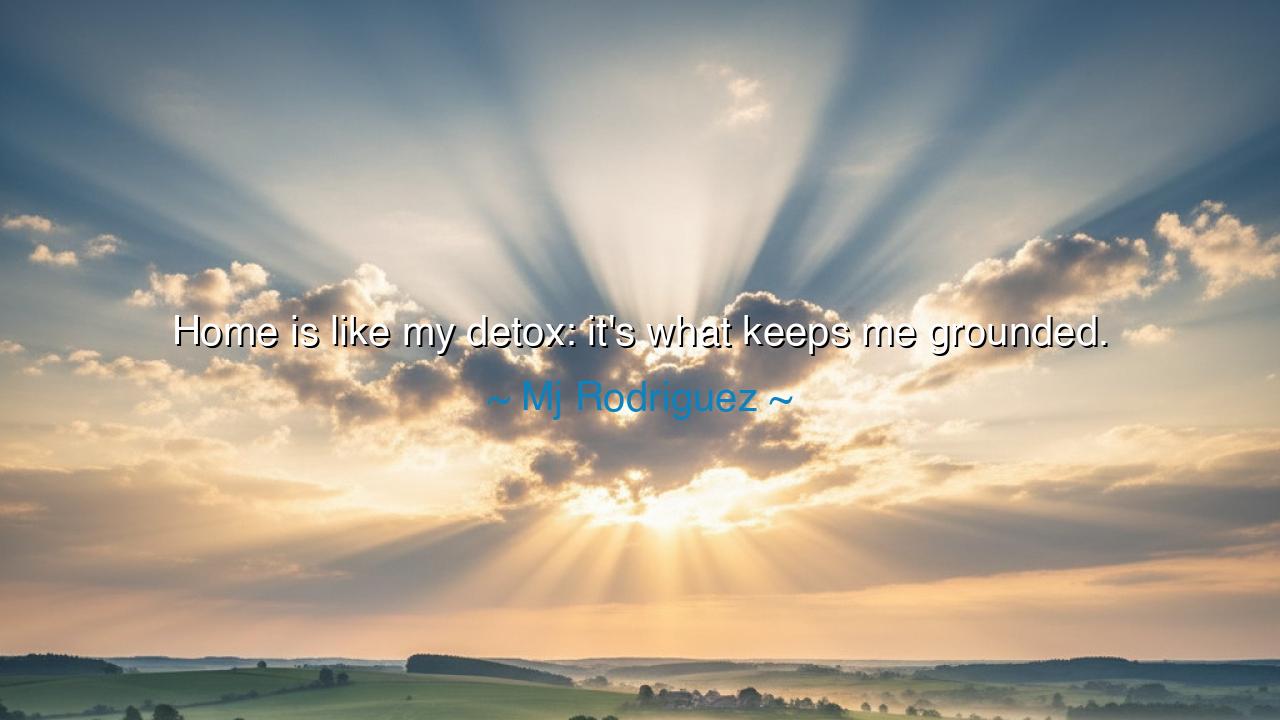
Home is like my detox: it's what keeps me grounded.






In the hush after bright labor, a clear sentence rings like a bell set low: “Home is like my detox: it’s what keeps me grounded.” Hear its medicine and its map. The world dazzles and distorts—lights that praise, screens that pull, roads that lengthen the shadow of the self. But this saying points to a humbler altar: the table that remembers your hands, the floor that knows your weight, the window that has watched you grow. Home is named not as escape, but as cleansing; not as retreat, but as recalibration. To be grounded is to have gravity again, to be returned to the center from which worthy journeys begin.
The ancients would have blessed this wisdom with barley and oil. They knew that every voyage requires a harbor that is more than wood and rope. The sailor scrubs salt from the skin before setting sail anew; the actor washes off the mask so the face can breathe. So too, the heart needs a daily detox—a purging of borrowed voices—so the truer voice can speak. Home becomes a small monastery of ordinary rites: a lamp lit at dusk, shoes set side by side, a pot singing on the stove. These are not decorations; they are anchors hammered into the seabed of the soul.
What does such cleansing ask of us? First, that we honor the physics of attention. The day coats us with invisible dust—praise and criticism, fear and hurry. We track it across the thresholds of our spirit until the floor grows slick. A faithful home absorbs that film and turns it to compost: chores that settle the body, quiet that rinses the mind, familiar faces that remind us we are more than our latest performance. In this way, detox is achieved not by fleeing the world, but by passing through a doorway where everything unnecessary falls away.
Consider a real story from the ledger of history. Mahatma Gandhi, amid marches and negotiations that could set continents trembling, returned to the simple disciplines of the ashram—spinning thread, walking at dawn, eating sparse meals. The world called these acts symbolic. They were also surgical. Each thread pulled him back to the ground of his calling; each plain meal bled the venom of ego. In the clamor of empire and resistance, the ashram was his home, his detox, the practice that kept his feet warm with dust instead of floating on applause.
Let us add a humbler parable. A dancer—call her Lila—touring from city to city, found herself dizzy from backdoors and bouquets. She began a ritual: every return, before unpacking, she swept her kitchen floor. It was not dirty; that was not the point. The broom’s rhythm stitched her soul back to the present, the bristles wrote a psalm on tile: you live here; you are a person, not a performance. In time, friends noticed her steadier gaze. Success had not shrunk; it had found a container. The broom was her staff, her grounded posture restored by the smallest home-ward liturgy.
The line also carries a warning. If we do not choose such grounding, the world will choose a counterfeit—numbing in place of detox, distraction in place of rest. We will call scrolling “unwinding,” shopping “reward,” noise “company.” But these leave us heavier, not lighter; more scattered, not whole. True detox costs less and asks more: a clear table, a slow meal, a walk that hears the evening birds. In these, the heart learns again its correct size—large enough to love, small enough to kneel.
Take the lesson and fasten it to your doorway. Make your home a craft, not an accident. Choose three grounding rites and keep them as you would keep a vow: (1) a daily threshold—leave your devices to sleep while you greet the room with water, breath, or sweeping; (2) a shared bread—one quiet meal each day or each week where gratitude is spoken aloud; (3) a night light—the same sentence whispered before sleep that returns you to your name. Let your space reflect your values: fewer trophies, more tools; fewer mirrors, more chairs. In this manner, home becomes your faithful detox, and you will step back into the world cleansed of its clamor, grounded enough to carry its weight without losing your own.






AAdministratorAdministrator
Welcome, honored guests. Please leave a comment, we will respond soon